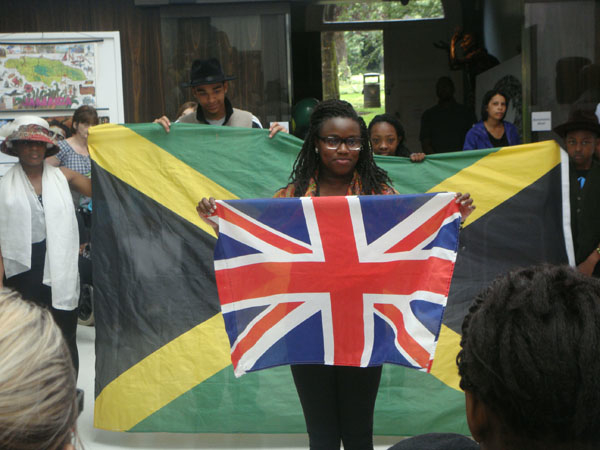
Jamaican Independence Day celebrations. Photo taken from the WAVE: Galleries, Museums, Archives of Wolverhampton Flickr page. CC BY-NC-SA 2.0
Jamaica achieved its independence from British rule 52 years ago. Like the citizens of most Caribbean states, Jamaicans today wrangle with the ripple effects of the region's history, including social and economic challenges.
Like many other regional territories, Jamaica was “discovered” by Christopher Columbus for the Spanish crown in the 1490s; its indigenous population was effectively annihilated, either intentionally or as a result of diseases that the Spanish brought with them. Midway through the 1600s, the island was seized by the British and remained under colonial rule for the next two hundred years as a pawn in the heinous transatlantic slave trade, during which African slaves were brought to the island, primarily to work the sugar estates.
Emancipation in 1834 brought an economic, social and mental shift to Jamaica and the region as a whole, and signaled the beginning of the separation process from their collective — and forcibly adopted — mother country. These Caribbean territories began to make their intentions known as early as 1958, when they joined together to form the West Indies Federation, which was to function as a single-state political entity that would operate free from British rule. The arrangement failed — partly due to Jamaica's dissatisfaction with how slowly the process of gaining independence was going — and the federation was soon dissolved, allowing each member nation to forge ahead with breaking the chains of colonial rule on its own. Jamaica and Trinidad and Tobago were the first to succeed, becoming independent states on Aug. 6, 1962 and Aug. 30, 1962, respectively. Other islands would follow suit well into the early 1980s.
But the road to self-governance has not always been smooth. The Westminster parliamentary system, which is strongly based on public opposition, didn't necessarily translate well to the psyche of a region that endured hundreds of years of human rights abuses and is still suffering its effects. The learning curve for a people who historically never had a say, continues to be a steep one, especially in a climate where corruption was already entrenched.
On the 52nd anniversary of their country's independence from British rule, a pair of Jamaican bloggers have reflected on the meaning of the occasion.
Jean Lowrie-Chin, whose post listed many of the island's achievements and compared its gains with what she deemed other less fortunate countries, cited a strong democracy, freedom of the press and citizens’ resourcefulness in the face of economic hardship as noteworthy things to celebrate:
I will listen to no ‘grinches’ today, those cynics trying to steal my joy in Emancipation and Independence. We keep talking ourselves into this ditch of despair, instead of raising our voices in thanks for our many blessings. If you think we are badly off, please check the international newscasts, where countries are at war and an airplane of ordinary passengers with everyday plans is shot out of the sky.
Her compatriot Nadine Tomlinson wrote about the country's progress and wondered whether “the child” that Jamaica was in 1962 would be proud of “the adult” it has become. She agreed with Lowrie-Chin that some of the island's greatest resources lie in its people, but suggested that Jamaicans are still held back from reaching their full potential, thanks to “psychological slavery”, adding that she saw “a dire need for an evolution of the collective mentality.”






